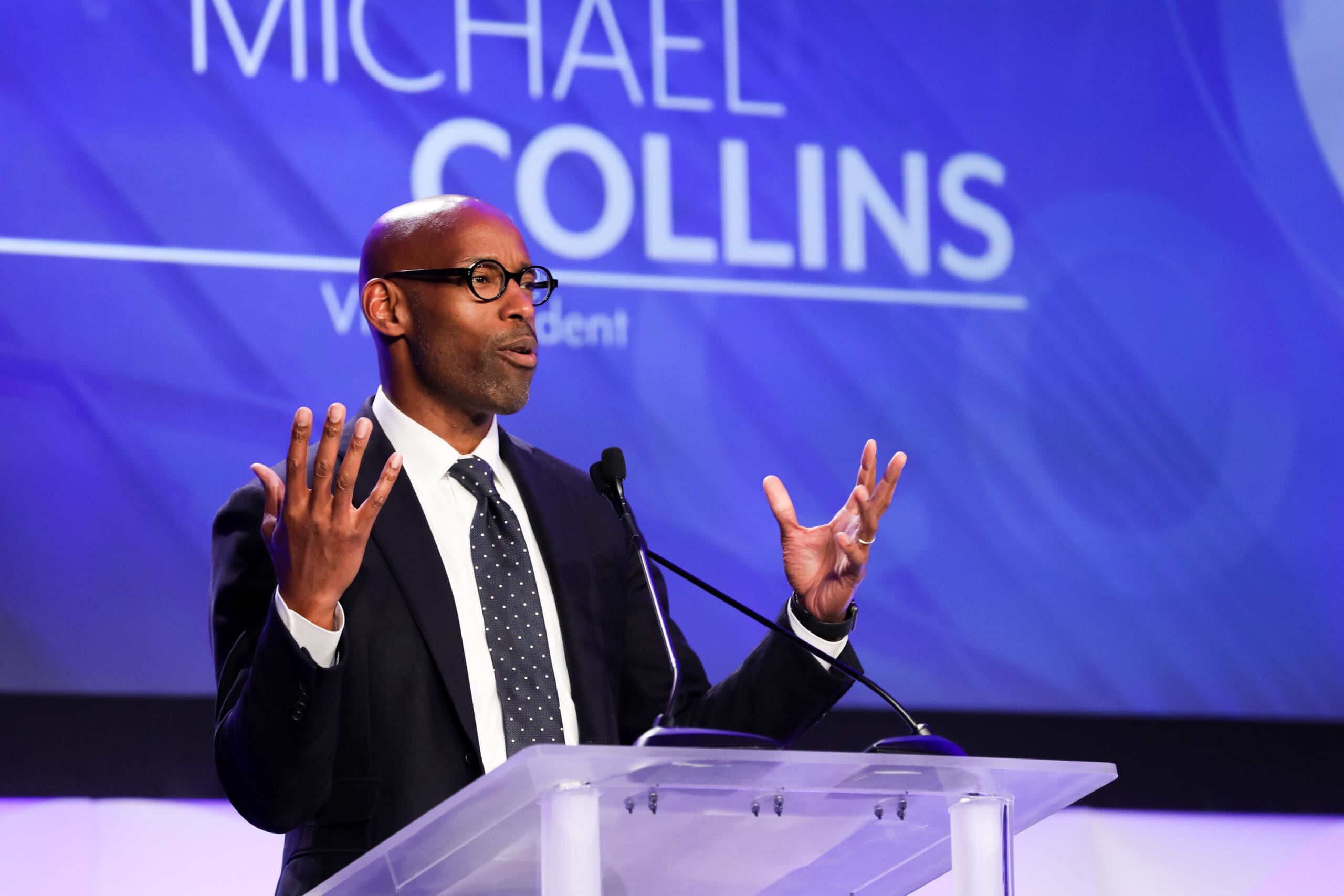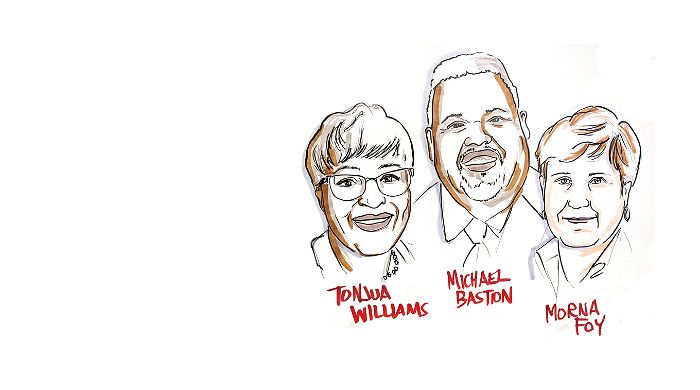
To Climb the Income Ladder, It Helps to Have a Network
October 23, 2018
At a Glance
JFF Vice President Michael Collins shares his personal story to highlight how our Postsecondary State Network helps people at the bottom of the income ladder climb up.
I live in Shaker Heights, Ohio—a community where children amble down the sidewalks of tree-lined streets, past single-family homes framed by manicured lawns, to neighborhood schools. It is a world away from where I grew up.
Like far too many African American children in the United States, I grew up in poverty. I spent my elementary and middle school years in the Northeast, in an inner-city triple-decker a block from a notorious public housing project that has since been razed. This experience is cruelly common; the poverty rate for African American families is almost three times higher than for white families.
But I had several factors in my favor that many young people from low-income families today do not. Completing college was one of the things that made a difference for me.
Now, every night, when I tuck my 7-year-old son into bed, I think about childhood friends and millions of others who do not have the high-level skills and college credentials they need to get good jobs, climb the income ladder, and raise their own children in safe, nurturing environments like Shaker Heights. Creating opportunities for the economic advancement of people at the bottom rung of the income ladder is not just a recurring reflection for me. It is a vocation.
I grew up in poverty. [. . .] Completing college is one of the things that made a difference. . . .
Why I Do What I Do
I have worked the last 14 years at JFF, a national nonprofit whose mission is to increase access to economic advancement for all. We work to help people who are stuck at the lower levels of the income ladder gain the skills and credentials they need to get jobs that pay family-supporting wages and contribute to upward mobility. Our postsecondary work is focused on community colleges because they are often the only after–high school institution that is accessible for low-income students.

Going to college and earning a credential that provides access to good jobs appears to be a simple-enough prescription for economic advancement. The problem is that our higher education system does not work well for people who start at the bottom.
A ‘Wicked’ Problem
Trying to increase upward mobility with a college completion strategy is what social policy experts would characterize as a wicked problem. By wicked, they mean that the issue has many interconnected facets that are not easily untangled.
The mobility strategy attempts to simultaneously improve a broad set of these factors—academic under-preparation, inadequate advising and counseling, inefficient transfer of credits, misalignment of credentials earned with available jobs, financial insecurity, and a host of others.
Our Network Strategy
At JFF, we believe that this type of multifaceted challenge requires a multidimensional solution. That’s why we use a network strategy that brings the knowledge of many people with wide-ranging expertise to bear on the many facets of the problem we face.
For more than a decade, JFF has supported the Postsecondary State Network as a key strategy to achieve our mission. Composed of 15 diverse member states, the Network spans community colleges of all sizes and kinds—large urban, mid-size suburban, and small rural. The Network also includes individuals with expertise in the academic, student services, career, and technical sides of college. They collaborate with Network peers who have expertise in policy at the state and system level and with association heads with intimate knowledge of the priorities of community college presidents. They also work with leading organizations involved in community college reform, which assess schools’ needs to improve student success and then broker those critical supports.
The PSN Members
Arkansas, California, Connecticut, Florida, Hawaii, Michigan, New Jersey, New York, North Carolina, Ohio, Oregon, Texas, Virginia, Washington, and Wisconsin.
The primary focus of the Network is to scale guided pathways—streamlined credential pathways that are aligned with good jobs. JFF supports the Network by
- convening community college innovators;
- disseminating evidence-based best practices;
- offering policy advisory services; and
- providing technical assistance and implementation services.
Here are some of the facts we’re fighting.
- More low-income students enroll in college today than ever before, but they are much less likely to graduate. Only 14 percent of students in the lowest quarter of earners graduate from college, compared to 60 percent of students from families in the top quarter of earners.
- Most low-income students begin college in less-selective higher education institutions than their upper-income peers. For example, 44 percent of low-income students attend community colleges immediately after high school, compared to only 15 percent of high-income students.
- Children born to parents in the lowest fifth of income earners tend to remain in the lowest fifth of earners when they become adults. Economists say that the bottom of the income distribution is sticky, meaning that it is very difficult to climb up.

How Can We Make a Difference?
If we increase the number of low-income students who complete high-value college credentials that lead to family-supporting jobs, we can increase the chance they will have to access the resources they need to raise their families in safe, nurturing environments. These environments are conducive to upward mobility, which all children deserve.
We are keenly aware that college is only one factor in the equation for economic mobility. My working-class grandparents’ lifetime savings, for example, helped me graduate. They also provided critical social and emotional support that got me to the finish line. And their sacrifice endures; it allows me to do the same for my son.
Are you working to increase upward economic mobility for low-income people? We’d love to hear from you and join forces. We will be smarter and stronger together.
Related Content

State Policy Paper Series: Strengthening Pathways toward Postsecondary Success
The emphasis in the papers on metrics, money, and systems integration reflects the collective vision of JFF’s Policy Leadership Trust for Student Success on the appropriate role of policy in catalyzing change among systems and…

Stackable Credentials Build Ladders to Success
Community college leaders discuss how they became convinced that a focus on non-degree programs, like stackable credentials, is essential for closing equity gaps on their campuses.

Leadership Academy
The Leadership Academy connects and supports a network of community leaders, building an understanding of future work and learning trends, and creating opportunities for reflection and design of whole-community strategies that best prepare young residents…

Postsecondary Network
Reforming math in Florida, ensuring equity in Washington, boosting student support in Michigan, partnering with the workforce system in New Jersey—JFF’s renowned network advances policies and practices that help all students attain high-value credentials. Reforming…

Postsecondary State Network Meeting
The twice-yearly meeting of the Postsecondary State Network
